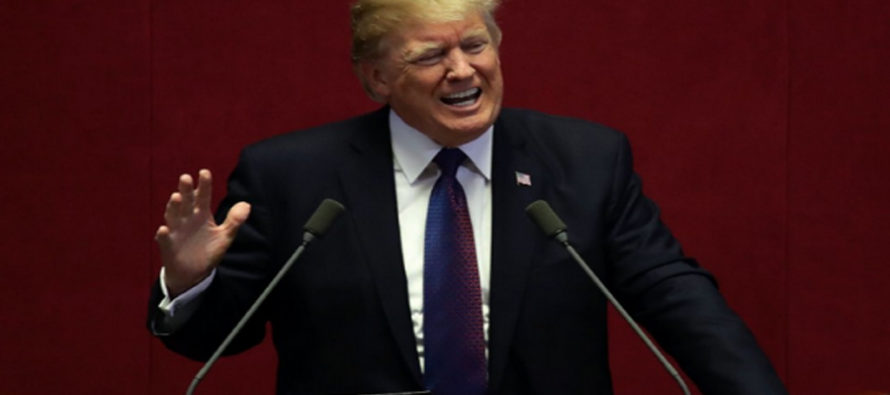Trump: warns Iran to “never again threaten” the United States.

On Monday, the Iranians shook off the possibility that a bellicose exchange of words between President Donald Trump and his Iranian counterpart could degenerate into military conflict, but expressed growing concern that America’s tightened sanctions could harm their fragile economy .
In his latest bailout, Trump tweeted last night that hostile threats from Iran could lead to disastrous consequences.
This happened after Iranian President Hassan Rouhani noted earlier that “the American must understand that peace with Iran is the mother of all peace and that the war with Iran is the mother of all wars” .
Trump wrote on Twitter: ”
never again threaten “the United States or you will suffer consequences that you have never had before in your entire history
Within a few hours, the Iranian state press agency IRNA rejected the tweet, describing it as a “passive reaction” to Rouhani’s remarks.
“Both America and Iran have been threatening each other in different ways for several years,” shrugged Mohsen Taheri, a 58-year-old editor.
A headline in a local newspaper quoted Rouhani saying, “Mr. Trump, do not play with the lion’s tail.”
The well-known Iranian political analyst Seed Leilaz has minimized the war of words, saying that he was “the storm before calm”.
Trump’s eruption on Twitter came after a week of heavy controversy over Russian interference in the 2016 US elections, after the Helsinki summit with Russian President Vladimir Putin.
Israeli Prime Minister Benjamin Netanyahu praised the “strong position” of the president of the United States after years in which the “Iranian regime has been spoiled by the world powers”.
Trump earlier this year excluded the United States from an international agreement to prevent Tehran from developing a nuclear weapon and ordered higher US sanctions, as well as threatening sanctions for companies in other countries that continue to do business with Iran.
With economic pressure, Trump said earlier this month that “at some point they will call me and say” let’s make a deal “and we’ll make a deal”.
Iran has rejected talks with the United States and Rouhani has accused the United States of fueling an “economic war”.
Rouhani also suggested that Iran could immediately accelerate the production of uranium in response to US pressure. Potentially this could exacerbate the situation that the nuclear agreement was trying to avoid: an Iran with a supply of enriched uranium that could lead to the manufacture of atomic bombs.
In the case of North Korea, the public war of words quickly cooled and gradually led to high-profile summit talks and denuclearization. There has been little tangible progress in a global push to free North Korea from its nuclear weapons program after the historic Trump-Kim summit on 12 June.
US Secretary of State Mike Pompeo flew to Pyongyang for follow-up talks earlier this month, but the two sides showed conflicting reports on the talks. The North Foreign Ministry has accused the United States of making “gangster-like” demands for its unilateral disarmament.
Some experts say that Kim is using diplomacy as a way to win off concessions and weaken international sanctions led by the United States.
Many in Iran expressed frustration that Trump seemed willing to engage with North Korea, which openly claimed to produce nuclear weapons, but not Iran, which signed the 2015 nuclear deal with world powers.
Since Trump has concluded the agreement, other nations involved – Germany, Britain, France, Russia and China, as well as the European Union – have reaffirmed their support for the agreement and have worked to try to curb Iran. .
“Iran is angry because Trump has responded to Tehran’s diplomatic engagement by withdrawing the United States from the nuclear agreement,” Iranian MP Heshmatollah Falahatpisheh told the PA.
He added, however, the war of words between the two presidents was predictable, since official diplomatic relations between the two countries have been frozen for decades.
“They express themselves through the speeches because the diplomatic channels are closed,” said Falahatpisheh, who heads the authoritative parliamentary committee on national security and foreign policy.
In his speech at the Library and at the Ronald Reagan Presidential Museum, Pompey chastised Iran’s political, judicial and military leaders, accusing several by name of participating in widespread corruption. He also said that the government “heartlessly repressed the human rights, dignity and fundamental freedoms of its people”.

